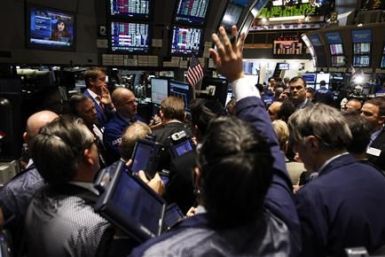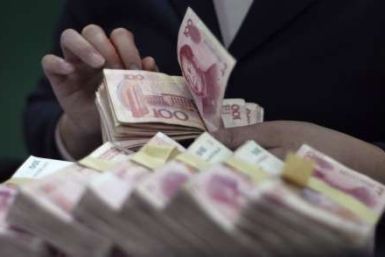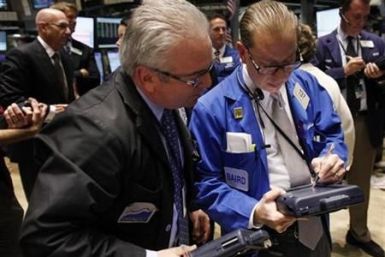Growth of the U.S economy is expected to remain sluggish next year as the nation suffers from high employment, high public debt, and rising commodity prices, says a report.
An unwilling Ireland finally agreed to a bailout to help prolong eurozone's jolly ride to doom, and analysts see a good chance of Portugal following suit in the coming months. However, the bigger question is if Spain, eurozone's fourth largest economy, is well insulated against a Greece- and Ireland-style crisis.
Chip giant Intel's fourth quarter revenue are likely tracking in the lower half of the company's guidance of $11.0 billion to $11.8 billion on sluggish PC trends, said FBR Capital Markets analyst Craig Berger.
Thailand’s economy fell into recession following a contraction in the past two consecutive quarters, as strong baht and a weak global demand hit the country’s exports.
In an eventful week, that passed through uncertainty about Ireland's response to a bailout offer, an unexpectedly higher Chinese inflation number and its policy response and largely mixed US data, investors remained cautious about the changing 'risk-friendliness' of commodities. In a mixed precious metals segment, silver rose 5 percent in the week and palladium was up by 4.4 pct while gold fell 1.1 percent and platinum dropped by 0.9 percent from previous Friday.
The US guest workers programs design needs an immediate and substantial in the wake of high unemployment in the nation.
U.S. and Japanese officials are meeting to discuss whether the U.S. can supply rare earths to Japan. But uncertainties surrounding the American reserves remain, as there are no active mines in the U.S.
U.S. stocks finish a volatile week with modest gains on Friday, finishing flat for the week as a whole. In the absence of major economic data in the U.S., investors focused on moves by China to rein in their inflation, while Ireland continues to negotiate a bailout arrangement from the European Union and International Monetary Fund (IMF).
South Korean companies demonstrate enormous potential and yet many of them trade at a significant discount to their Asian and global peers.
S&P 500 Index slid 5.63 points, or 0.49 percent, to trade at 1,190.71 at 09:50 a.m. EST. The Dow Jones Industrial Average is down 44.77 points, or 0.40 percent, to trade at 11,136.46. The Nasdaq Composite Index fell 0.44 percent to trade at 2,503.47.
The top pre-market NASDAQ stock market losers are: Shengkai Innovations, Kirkland's, Autodesk, Sonus Networks, Intuit, Harbin Electric, SunPower, Blue Coat Systems, Whole Foods Market, and DryShips.
The top pre-market NASDAQ stock market gainers are: Dell, Immunogen, Thoratec, ASML Holding, BSD Medical, Brocade Communications Systems, Wynn Resorts, Amgen, ARM Holdings, and Cisco Systems.
An Agricultural commodity price rally in the U.S. will help the wobbly recovery in three ways - by boosting inflation a tad and narrowing the worrying trade deficit by a whisker, while not hardening enough to snuff out the fledgling recovery.
A surge in food prices propelled Chinese consumer prices to a 25-month high in October, despite the government's efforts to control inflation. Food prices in the world’s second largest economy went up by 10.1 percent in October year-on-year.
Futures on the S&P 500 lost 3.70 points to 1,194.00, futures on the Dow Jones Industrial Average are down 31.00 points to 11,145.00 and Nasdaq100 futures are down 5.00 points to 2,129.25.
Rubber futures rallied on Tokyo Commodity Exchange (TOCOM) on Friday, on expectations China may top off its stocks and on continued supply concerns.
Pfizer Inc. and Bristol-Myers Squibb Co. said they have halted a late-stage study of their experimental blood-thinner apixaban because of safety concerns.
Credit Suisse upgraded chip maker Qualcomm to outperform from neutral and raised profit estimates of the company, citing improved visibility on earnings growth.
The top after-market NASDAQ stock market losers are: Shengkai Innovations, Autodesk, Blue Coat Systems, Intuit, China BAK Battery, Marvell Technology Group, Polycom, Motricity, Windstream, and Nuance Communications.
The top after-market NASDAQ stock market gainers are: Shoe Carnival, Dell, Focus Media Holding, Wet Seal, Web.com Group, ArQule, Immunomedics, Acme Packet, AsiaInfo-Linkage, and EDAP TMS.
Microsoft hopes that its newly launched hands-free sensor gadget, Kinect's growing popularity will help revive sales of its Xbox game console in the upcoming shopping season.
Retail sales in October picked up pace, and brightened the outlook for year-end shopping as purchases rose 1.2%, the highest in the last seven months.
The University of Michigan forecasts the U.S. economic recovery to be sluggish in the near term due to the weak jobs market, deleveraging, belt-tightening within state and local governments, and the still-felt impact of the housing collapse.
Stocks surged, buoyed by the successful huge initial public offering of General Motors (NYSE: GM), reports that the Republic of Ireland will receive a bailout to solve its troubled banking system and better-than-expected manufacturing activity data.
Yields on municipal bonds has risen recently, with long-term yields rising more sharply than those on the short-end since the beginning of the November.
As “Black Friday” approaches next week, U. S. retailers are expecting a strong holiday season – at least, compared to the dismal performance of the past two years.
The Conference Board reported that its index leading economic indicators (LEI) for the U.S. increased by 0.5 percent in October to 111.3, following an 0.5 percent increase in September, and a 0.1 percent increase in August.
Shares of automaker General Motors opened at $35 in its first trading day on the NYSE after recovering from a government funded bailout. The opening price was an increase of 2 percent from its IPO price of $33.
S&P 500 Index gained 13.19 points, or 1.18 percent, to trade at 1,192.55 at 09:50 a.m. EDT. The Dow Jones Industrial Average is up 122.79 points, or 1.12 percent, to trade at 11,130.67. The Nasdaq Composite Index rose 1.29 percent to trade at 2,508.13.
Shares of auto giant General Motors (NYSE: GM) are up almost 9 percent in early trading after yesterday’s blockbuster initial public offering that was estimated to have 30 percent greater demand than initially expected. The offering is the biggest in U.S. history









